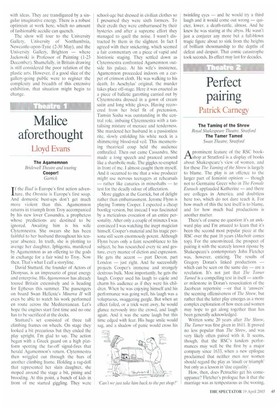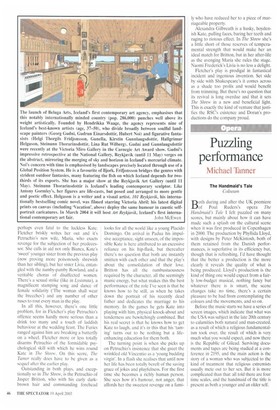Perfect pairing
Patrick Camegy
The Taming of the Shrew Royal Shakespeare Theatre. Stratford The Tamer Tamed Swan Theatre, Stratford
A prominent feature of the RSC book
shop at Stratford is a display of books about Shakespeare's view of women, and for these The Taming of the Shrew is largely to blame. The play is an offence to the larger part of feminist opinion — though not to Germaine Greer who in The Female Eunuch applauded Katherine — and there are colleges in America, and doubtless here too, which do not dare teach it. For how much of this the text itself is to blame, and for how much bad productions is another matter.
There's of course no question it's an awkward play and I'm amazed to learn that it's been the second most popular piece at the RSC over the past 16 years (Macbeth comes top). For the unconvinced, the prospect of pairing it with the scarcely known riposte by Shakespeare's contemporary John Fletcher was, however, enticing. The results of Gregory Doran's linked productions — which can be seen on the same day — are a revelation. It's not just that The Tamer Tamed is a compelling text in itself — another milestone in Doran's resuscitation of the Jacobean repertoire —or that it 'answers' the seeming offensiveness of The Shrew, but rather that the latter play emerges as a more complex exploration of how men and women may hope to get along together than has been generally acknowledged.
Written some 20 years after The Shrew, The Tamer was first given in 1611. It proved no less popular than The Shrew, and was very likely often paired with it. It seems, though, that the RSC's tandem performances may well be the first by a major company since 1633, when a new epilogue proclaimed that neither men nor women should regard the play as 'insult or triumph' but only as a lesson in 'due equality'.
How, then, does Petruchio get his comeuppance? Fletcher's prologue has it that the marriage was as tempestuous as the wooing, perhaps even fatal to the luckless Kate. Fletcher briskly writes her out and it's Petruchio's new wife, Maria, who exacts revenge for the subjection of her predecessor. She calls in aid not only Bianca, Kate's 'sweet' younger sister from the previous play (now proving more poisonously shrewish than her sibling), but her sister Livia, entangled with the namby-pamby Rowland, and a veritable chorus of disaffected women. There's a sexual strike (like in Lysistrata), a magnificent stamping song and dance of female solidarity ('The woman shall wear the breeches') and any number of other ruses to rout every man in the play.
In all this, however, there's one little problem, for in Fletcher's play Petruchio's offence seems hardly more serious than a drink too many and a touch of laddish behaviour at the wedding feast, The Furies ranged against him are breaking a butterfly on a wheel. Fletcher more or less totally disarms Petruchio of the formidable psychological skill with which he wins round Kate in The Shrew. On this score, The Tamer really does have to be given as a sequel after the earlier play.
Outstanding in both plays, and exceptionally so in The Shrew, is the Petruchio of Jasper Britton, who with his curly darkbrown hair and commanding forehead looks for all the world like a young Placido Domingo. On arrival in Padua his impulsive acceptance, sight unseen, of the impossible Kate is here attributed to an excessive reliance on his hip-flask, but thereafter there's no question that both are instantly smitten with each other and that the play's about the consolidation of their love. Britton has all the rumbustuousness required by the character, all the seemingly manic energy, but what makes this the best performance of the role I've seen is that he knows how to be still, as when he takes down the portrait of his recently dead father and dedicates the marriage to his memory. In the games he gets Kate into playing with him, physical knock-about and tenderness are bewitchingly combined. But his real secret is that he knows how to get Kate to laugh, and it's in this that his 'taming' turns out to be nothing but a lifeenhancing education for them both.
The turning point is when she picks up on Petruchio's insistence that she greet the wrinkled old Vincentio as a 'young budding virgin'. In a flash she realises that until now her life has been totally bereft of the saving grace of jokes and playfulness. For the first time she becomes a richly human person. She sees how it's humour, not anger, that affords her the sweetest revenge on a fami
ly who have reduced her to a piece of marriageable property.
Alexandra Gilbreath is a husky, hoydenish Kate, pulling faces, baring her teeth and raging to riotous effect. In The Shrew she's a little short of those reserves of temperamental strength that would make her an ideal match for Britton, but in her after-life as the avenging Maria she rules the stage. Naomi Frederick's Livia is no less a delight.
Fletcher's play is prodigal in fantastical incident and ingenious invention, Set side by side with Shakespeare's it comes across as a shade too prolix and would benefit from trimming. But there's no question that its revival is long overdue and that it sets The Shrew in a new and beneficial light. This is exactly the kind of venture that justifies the RSC's existence and Doran's productions do the company proud.



































































 Previous page
Previous page